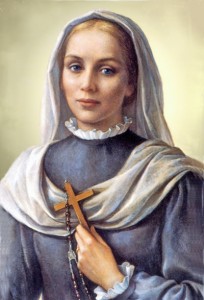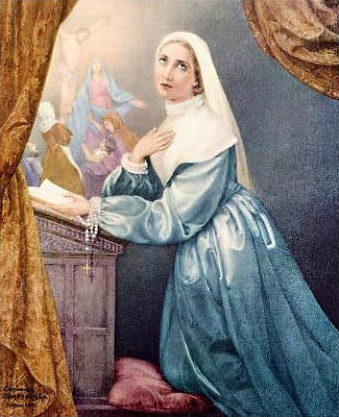St. Virginia Centurione Bracelli
St. Virginia Centurione Bracelli
Daughter of Giorgio Centurione, and imposing and controlling individual who became the Doge of Genoa, and Lelia Spinola. Raised in a pious family, she felt drawn to religious life as a child. However, due to family position she agree to an arranged marriage to Gasparo Grimaldi Bracelli on 10 December 1602. He was a drinker, a gambler, and though the couple had two daughters, Lelia and Isabella, he was little of a father or husband. Virginia was widowed on 13 June 1607 after five years of marriage, aged 20, and with two small children.

Virginia moved in with her in-laws, cared for her children, and dedicated her free time to prayer and charity. When her daughters were grown and married, Virginia devoted herself entirely to caring for the sick, aged, and abandoned children. In late 1624 and early 1625 war in the region led to many orphans, some whom Virginia took in and cared for, and she worked with refugees in the town. When her mother-in-law died in August 1625, Virginia poured herself into the work, turning her house into a refuge and founding the Cento Signore della Misericordia Protettrici dei Poveri di Gesù Cristo.

Her house was overrun with the needy during a plague and famine in 1629 – 1630. To house them all Virginia rented the vacant convent of Monte Calvario and moved her charges there in 1631. Due to crowding, extra housing was built in 1634, Virginia was soon caring for 300 patients, and in 1635 she received official government recognition for her hospital. Virginia worked closely with the young women in her houses, teaching them religion and ways to earn a living.
The expenses of Monte Calvario were excessive, so Virginia bought two villas and started construction of a church dedicated to Our Lady of Refuge. It became the mother church of the Institution, whose Rule was written between 1644 and 1650 and which was divided into two congregations: Suore di Nostra Signora del Rifugio di Monte Calvario (Sisters of Our Lady of Refuge in Mount Calvary) and Figlie di Nostra Signora al Monte Calvario (Daughters of Our Lady on Mount Calvary). When the group of Protectors, the superiors and governors of the Institute was selected in 1641, Virginia retired from administration, working as the humblest sister, doing chores on the grounds and begging for alms for the Institute.
Sadly, though the Institute was a success, healing the sick, educating children, training adults, and helping the dissolute return to productive lives, assistance, personal and financial, began to decline. Without the chance to work with Virginia, many of the middle and upper class did not participate, fearing the poor and rough residents. Though her health was failing, Virginia returned to active administrative duties. She worked for general spiritual development throughout the region, working for the choice of the Blessed Virgin Mary as patron of the republic of Genoa in 1637, for the institution of the Forty Hours’ Devotion in 1642, and the revival of home missions in 1643. She acted as peacemaker between noble houses, and aided in the reconciliation of Church and Republic authorities in 1647, ending a dispute caused by the government abandoning support of the Institute. Virginia continued working up to the end of her days, and in later years received the gifts of visions and interior locutions.
Excerpted from Saints.SQPN.com